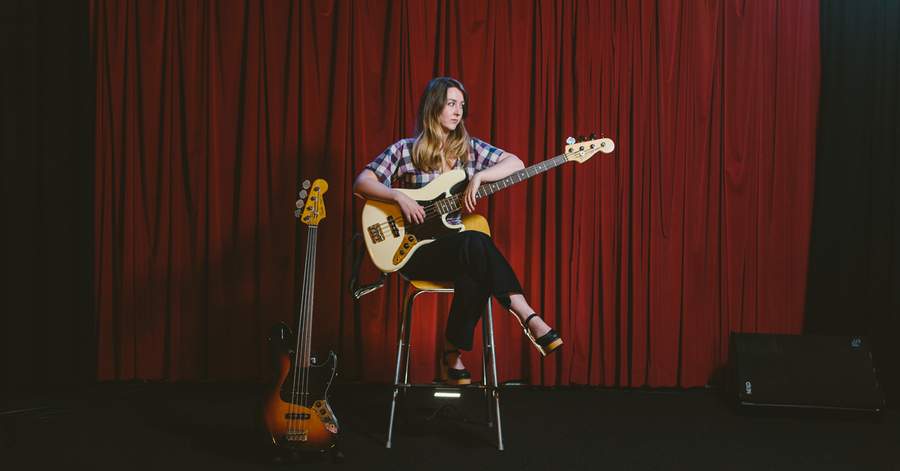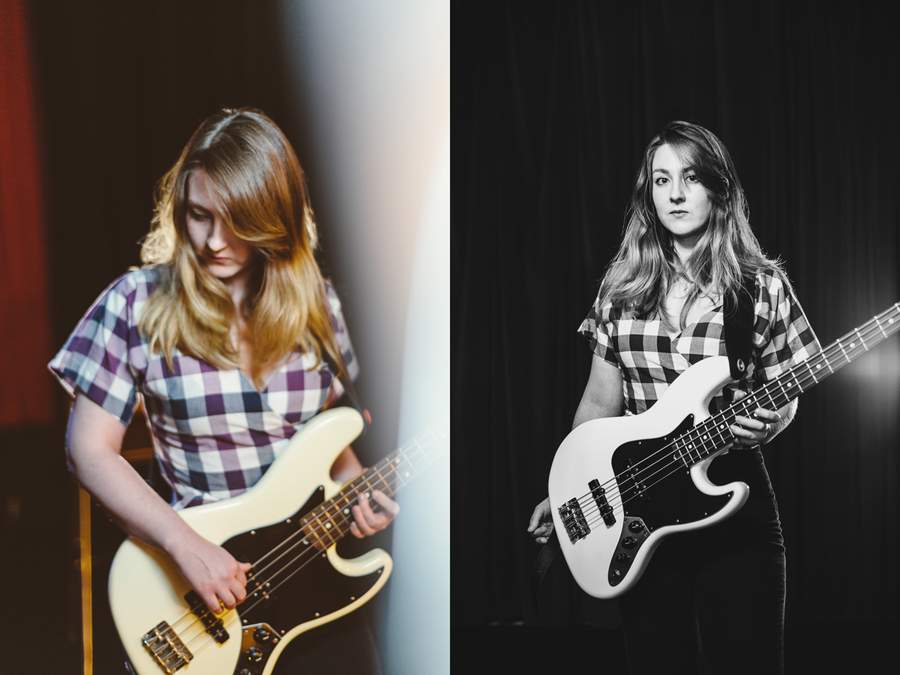How Gemma Helms Manages to Play Bass in Seven Bands at the Same Time
Gemma Helms is one of Triple R’s admin superstars. Outside of working hours, however, she plays bass in no less than seven bands. The musical multi-tasker explains how she keeps it all together – and why she’s, well, totally addicted to bass.
As told to Mia Timpano
Photos Xavier Fennell
I’ve always been a very arty person; as a kid, I loved drawing, painting and making things. But I didn’t really get into music until I started high school. The first music I bought was a Spice Girls cassette and a Michael Bublé CD, so my taste was questionable. I’d played a bit of keyboard in primary school, but got frustrated because I could never get the coordination between my hands. At the start of high school, they gave us an introduction to the music department – it was really cool and alluring. I wanted to play drums, but they ran out of spots for drums, so I had a choice of either bass guitar or French horn – that’s where it all started.

Photo by Xavier Fennell
My first-ever band was called Junior Walker. There’s a famous musician called Junior Walker – a Motown saxophonist and vocalist – but I didn’t learn that till later. My dad hooked me up with that – his friend’s son was looking to start a band. I was 16 or 17. We started doing rehearsals at my school. It was a Catholic girls’ school, so bringing a bunch of boys into the music room always got some looks from teachers. We played straight-up rock ’n’ roll, three chords, and I was playing way too many notes. I’d started feeling like, ‘Oh, I can actually play now.’ So I was riffing up a storm, going a bit crazy with scales, and running up and down the neck. But I was just so enthusiastic about having the ability to play the bass.
In year 12 I had a big Jaco Pastorius phase. He was a jazz bassist who played with Joni Mitchell and Herbie Hancock. He recorded a solo album, which is kind of unheard of for a bass player, and it’s phenomenal. I had to play a repertoire for year 12 VCE Music and one of my favourite pieces was a piece by Jaco called ‘Portrait of Tracy’; it includes all these harmonics and melodies and doesn’t sound like an electric bass – it’s such a beautiful piece of music. From that point I decided I wanted to play bass in this sensitive, real, thoughtful way rather than just slappin’ the bass guitar like Flea.
I’ve always been in multiple bands since high school. At the moment I’ve got seven different things on the go: No Sister, Mares, Poppongene, Astral Skulls, Hooper Crescent, Full Flower Moon Band, and Natasha Johanna. Because bass is such a versatile instrument, it’s easy to slip into so many different styles of music, and I like that challenge of playing a different genre or getting used to different styles of songwriting. I think that’s the appeal – and it keeps things fresh, as well. I’d get bored if I was just doing the one thing. All the different bands feed into each other, too. I’ll take bits of the style I play in one band and use it for writing a bassline in another band, even though they might be completely different – so it gives me more scope to try out ideas, rather than being on a narrow track or pathway.
It really started to ramp up with the multiple band thing since the start of 2018. I’ve found it so beneficial for my playing, because it’s hard to get motivation when you’re practising by yourself in your room. Playing with other people pushes you to get better. When you’re writing music together and trying out different things, there’s an immediacy that comes with that – listening to what someone else plays and having to respond with your instrument. I like that – even though I also like thoughtful bass playing. The thoughtfulness doesn’t necessarily mean that I’m spending weeks working on a single bassline. It’s more when I hear someone play a part, I think about how my part can complement that – that’s a huge role for a bassist.
A lot of people say you can’t hear the bass until you take it out of a track. As a bassist, you’re this bedrock for the music. You can have bits where the music highlights your part, but most of the time you’re there to support all the other crazy things happening on top, which I like – I feel I’ve got the reins over a band sometimes. I don’t know how people are frontpeople or vocalists, that’s very scary to me. I also don’t think that way about music; I don’t tune in to lyrics a whole lot. I’m usually listening to what’s happening harmonically or rhythmically – that’s what grabs me about a song. That stuff can stir up a whole lot of emotion without having to literally say it.

Photo by Xavier Fennell
One of the best things about playing music with so many bands is meeting people I don’t think I’d otherwise be friends with. I’m not super-outgoing. Especially when I left high school, I had such bad social anxiety. Playing in bands helped me talk to other people – without that I definitely wouldn’t have the confidence I have today, or the openness in going up to other people and having a chat with them. Music allows people who are shyer or inward to have common ground; there’s something to talk about. This also forces me to go out and meet lots of characters. I’ve met some people who are amazingly supportive of musicians. They don’t necessarily play themselves, but they turn up to every gig; I don’t know how they do it.
I can’t be in just one band; I get itchy. When I go to a gig where I’m not playing and I see a bass player having a great time, I get so jealous. I want to be up there, I want to be playing. And I think that’s how I’ve ended up in all these different projects – because I don’t really seek out people to play with, it just kind of happens. People say, ‘I’d love to have you play on this thing.’ And I have a very hard time saying no, because I have that envy of what if someone else has such a good time playing with them?
My best piece of advice for people who want to be in multiple bands is to turn up at rehearsal. I have so many nights where I come home and dread going – not because I’m dreading rehearsal, but because getting started is the hardest part. So just turn up to things and you’ll be pleasantly surprised. You never know what you’ll get out of it, even if you’ve been working all day or had a bad day. I had a rehearsal the other week with someone, and she was having a terrible week, and this sounds a bit corny, but she said, ‘I forgot how good it feels to just play music.’ And it does.
Gemma’s Favourite Bassists
CAROL KAYE ‘Carol was part of a group of session musicians nicknamed The Wrecking Crew. They played on Pet Sounds by The Beach Boys, and for Nancy Sinatra and Sonny and Cher. Carol played on thousands of recordings from the ’60s and the ’70s – most notably she contributed the basslines on ‘These Boots Are Made for Walkin’’ and ‘Good Vibrations’. She is my number one bass inspo.’
GAIL ANN DORSEY ‘Gail played with Bowie for his live shows in the ’90s and 2000s – and not only can she play bass, but she’s got an amazing set of pipes. They would do a version of ‘Under Pressure’ together and she would do all Freddie’s parts. I can’t sing at all, but she is phenomenal.’
TINA WEYMOUTH ‘Tina is the bassist and founding member of Talking Heads. She later teamed up with her husband and fellow Talking Heads member Chris Frantz to form the band Tom Tom Club. I’m so in love with Tina’s style of playing at the moment. Her basslines are super-creative and hugely shape the sound and groove of the music she makes.’
This story first appeared in The Trip, Triple R's subscriber magazine. The Trip is published three times a year (in April, August and December) and is direct-mailed to Triple R subscribers. Mia Timpano is the editor of The Trip, Triple R’s content and communications coordinator, a freelance writer, and an extreme metal enthusiast. Xavier Fennell is a freelance photographer who frequently takes stunning snaps of Triple R events and interviews. You can check out more of his work on Instagram.